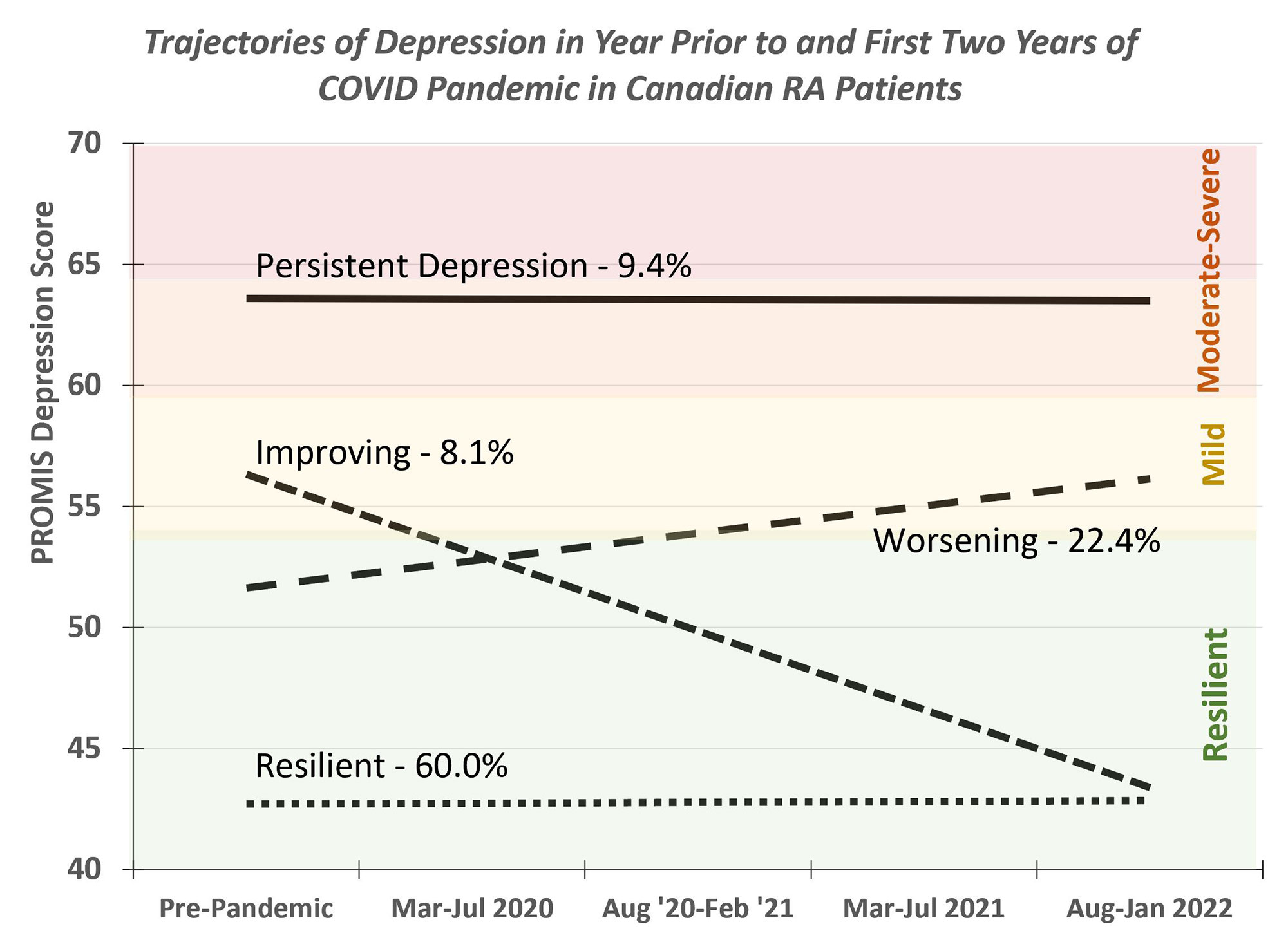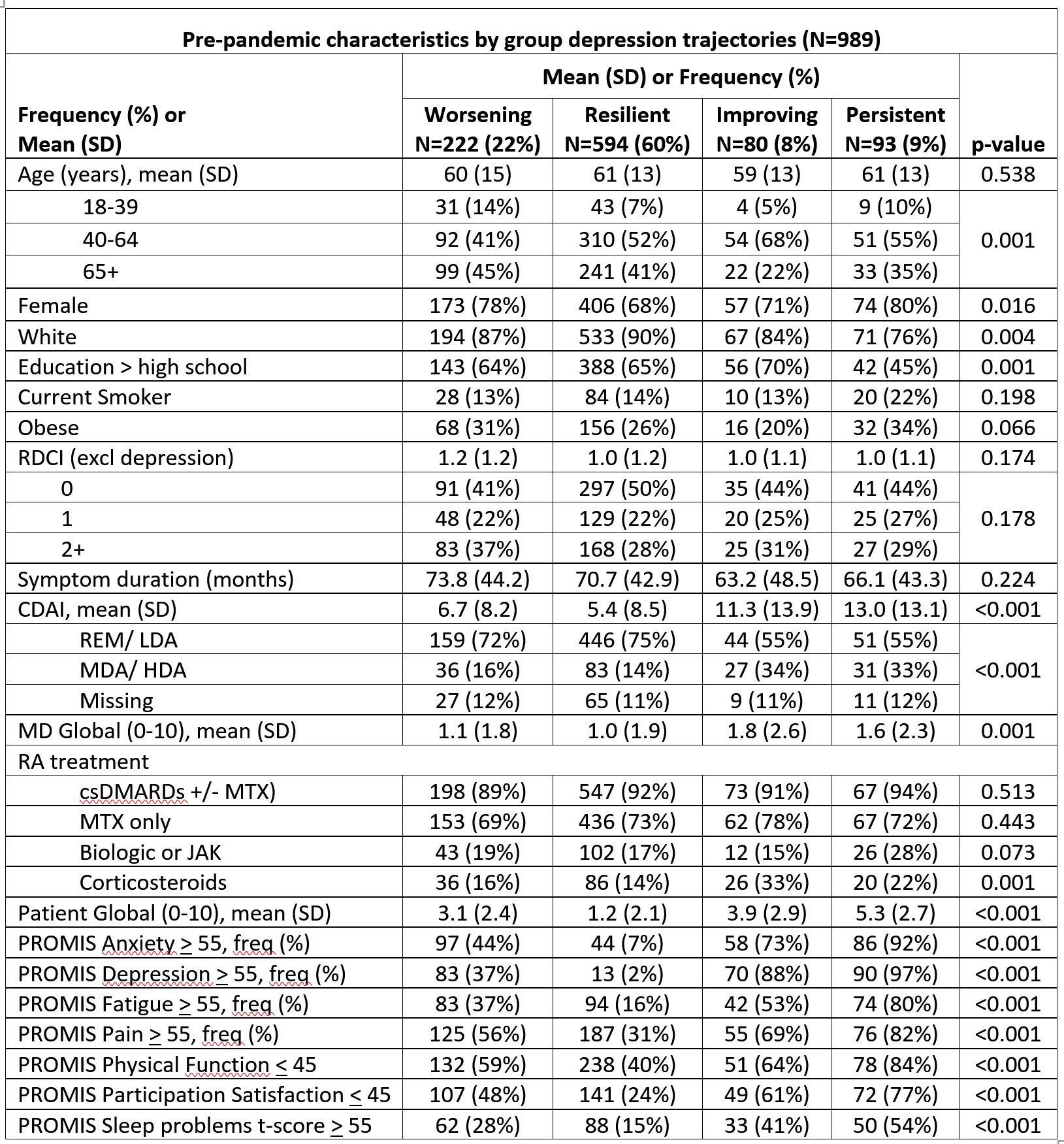Session Information
Session Type: Poster Session D
Session Time: 1:00PM-3:00PM
Background/Purpose: Growing evidence points to considerable mental health impacts of the prolonged COVID-19 pandemic, though data from longitudinal studies in rheumatic diseases are sparse. We explored distinct trajectories of depressive symptoms in the year prior to and throughout the first 2-years of the COVID-19 pandemic in adults with RA .
Methods: The Canadian Early Arthritis Cohort (CATCH) is a prospective multi-center study of adults with early RA (symptoms < 1 year; 81% met 2010 ACR/EULAR criteria at enrolment) who receive care from rheumatologists across Canada. Prior to the pandemic, participants completed patient-reported assessments of symptoms and function (i.e., PROMIS-29 and patient global), and rheumatologists conducted RA assessments during scheduled in-person study visits. After March 2020, ongoing collection of key outcomes continued at in-person and remote visits.
We used group-based trajectory modeling to identify latent groups of participants with at least mild depression (PROMIS 4a depression score ≥55) in participants with ≥1 visits in the year prior to the pandemic (3/19-2/20) and ≥1 visits during pandemic (3/20-1/22) and identified prepandemic individual and clinical characteristics and PROs associated with each trajectory.
Results: The analytic sample included 989 participants with a mean (SD) age of 60 (14) and disease duration of 6 (4) years. 73% were women, 84% white, 60% had completed some post-secondary education, and 77% were in CDAI REM/LDA at visit closest to the start of pandemic.
The best model included 4 groups (posterior probabilities ≥0.80 for each group): 1) Resilient (none-minimal depression throughout: N=594; 60%); Worsening (none/minimal to mild: N=222;22%); Improving (mild-resilient: N=80;8%); and Persistent (moderate-severe throughout: N=93;9%)(see figure). As compared with the Resilient group, those with Worsening Depression were more likely to be female, obese, have a higher pre-pandemic CDAI, MD and patient global, and report worse pain, disability, anxiety, depression, fatigue, sleep disturbance, and lower participation (Table).
Conclusion: Although 60% of Canadian RA patients had consistently good mental health during the first 2 years of the COVID-19 pandemic, more than 1 in 5 reported deteriorating mood suggesting a cumulative impact over time; 9% had persistent depression and 8% improving mood. The proportion of adults with RA with at least mild symptoms of depression may be more than twice that reported for the general Canadian population. As compared with those with good mental health throughout, participants with worsening depressive symptoms during the pandemic were more likely to be female, obese, have higher pre-pandemic disease activity, symptoms, disability, and higher impairments in participation. Given the impact of depression on quality of life, inflammation, and disease management, vulnerable groups may benefit from more frequent evaluation and additional support from rheumatology providers.
To cite this abstract in AMA style:
Bartlett S, schieir o, Valois M, Pope J, Bessette L, Boire G, Hitchon C, Keystone E, Thorne C, Tin D, Hazlewood G, Bykerk V. PROs and Sociodemographic Factors in Year Prior to COVID Predict Trajectories of Depressive Symptoms in Adults with RA in First 2 Years of Pandemic: Data from the Canadian Early Arthritis Cohort [abstract]. Arthritis Rheumatol. 2022; 74 (suppl 9). https://acrabstracts.org/abstract/pros-and-sociodemographic-factors-in-year-prior-to-covid-predict-trajectories-of-depressive-symptoms-in-adults-with-ra-in-first-2-years-of-pandemic-data-from-the-canadian-early-arthritis-cohort/. Accessed .« Back to ACR Convergence 2022
ACR Meeting Abstracts - https://acrabstracts.org/abstract/pros-and-sociodemographic-factors-in-year-prior-to-covid-predict-trajectories-of-depressive-symptoms-in-adults-with-ra-in-first-2-years-of-pandemic-data-from-the-canadian-early-arthritis-cohort/


